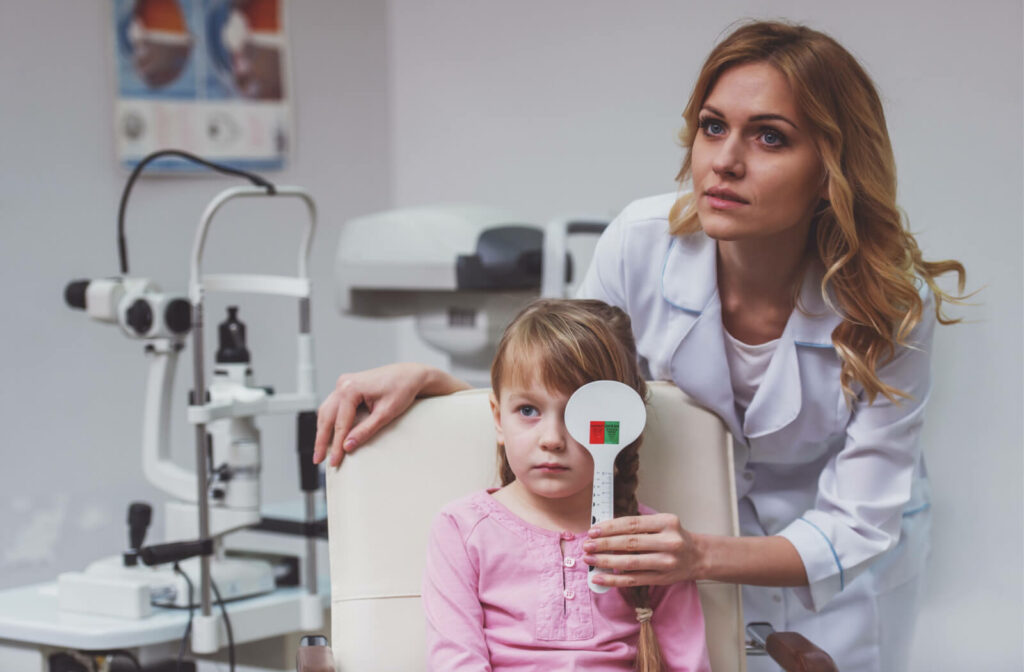In a world where “time is money,” many people hesitate to book necessary appointments like comprehensive eye exams because they don’t know how long it’ll take. Seeing the eye doctor can indeed mean lengthy appointments at times, but you might be surprised to learn how short an exam could be: a typical comprehensive eye exam can take between 30 minutes to an hour including working with an opticians afterwards to pick out glasses and contact lenses.
This article explores a couple of things in addition to the typical length of an exam. We’ll also examine why these appointments are important and touch on the difference between a contact lens fitting exam and a comprehensive exam and how it might add time to the average appointment.
Importance of Regular Eye Exams
Many assume that a changing prescription is a primary or the only reason to regularly get eye exams. While this is a good reason to get the recommended exams, other reasons are arguably more important at times.
Our ocular health can change quickly. The problem is that some conditions or diseases, such as glaucoma or cataracts, can develop rapidly without symptoms at the early stages. So, regular eye exams offer the best chance of an eye doctor diagnosing and correcting problems with minimal damage or vision loss.
One of the most incredible benefits of an eye exam is that your optometrist can detect many other health problems unrelated to the eyes. These problems include brain tumors, cancer, high blood pressure, or diabetes.
How Often Do You Need an Eye Exam?
According to the American Optometric Association, the time between eye exams varies from annually to every 2 years, or sooner if recommended by your optometrist, based on age and circumstances like other health conditions or risk factors.
Keep in mind that these serve as the minimum recommendations for frequency. Your eye doctor knows how to care for your eye health and may recommend a different schedule based on your needs.
Unless otherwise suggested by your optometrist, this is the recommended schedule:
- Birth to 2: Within the first 6 to 12 months
- 3 to 5: At least once before First Grade
- 6 to 17: Annually
- 18 to 64: Every 2 years or sooner
- 65 and older: Annually
How Long Do Eye Exams Take?
The appointment length is hard to pinpoint because it can vary widely based on what your eye doctor is checking for. A new-client eye examination will likely take much longer than a follow-up because of extra things like medical history or additional baseline tests.
With that in mind, an average eye exam can take anywhere between 30 minutes to several hours. The primary thing that typically determines the length of your appointment is which tests or instruments the eye doctor uses.
What Can Affect the Exam Length?
Procedures and tests that can affect your exam length include:
- Visual acuity test: Determines how well you see.
- Refraction testing: Determines whether you have a refractive error, like nearsightedness or farsightedness.
- Ophthalmoscopy: Displays the back of your eye after the optometrist dilates your pupils.
- Retinal Imaging: Displays a high resolution, panoramic picture of the back of your eye.
- Tonometry: Determines internal eye pressure using a special instrument.
- Pachymetry: Measures corneal thickness using ultrasound and is typically used for baseline measurements.
- Perimetry: Determines how far to the side you can see without moving your eyes. Also known as a vision field test.
Preparing for an Eye Exam
If there are any special instructions in preparation for your exam, your optometrist will typically let you know before you arrive. Outside of that, here are a few things you can do to prepare:
- Wear comfortable clothes.
- Minimize makeup until afterward, especially around the eyes.
- Come with your personal and family medical history prepared, especially for the first appointment.
- Arrange transportation home if your eyes will be dilated (some offices have policies regarding pupil dilation and driving afterward, so check with your eye doctor beforehand).
Comprehensive Eye Examination vs. Contact Lens Fitting Exam
In a nutshell, a comprehensive exam is designed to detect any problems with your eyes, from vision to disease, while a contact lens exam and fitting is designed to assess, measure, and fit your eyes for contact lenses.
Usually, a contact lens fitting exam is shorter than a comprehensive exam, but it isn’t a replacement. If you’re interested in getting contact lenses, many eye doctors can do both back-to-back. Just expect the appointment to run a little longer.
Booking Your Next Eye Exam
Time is valuable, but so are your eyes. If it’s time for your next eye examination, give us a shout at Optical Illusions. Our professional staff is available to answer all your questions and book you in to see one of the optometrists. We’ll give you the best time estimation possible based on the appointment needed.



